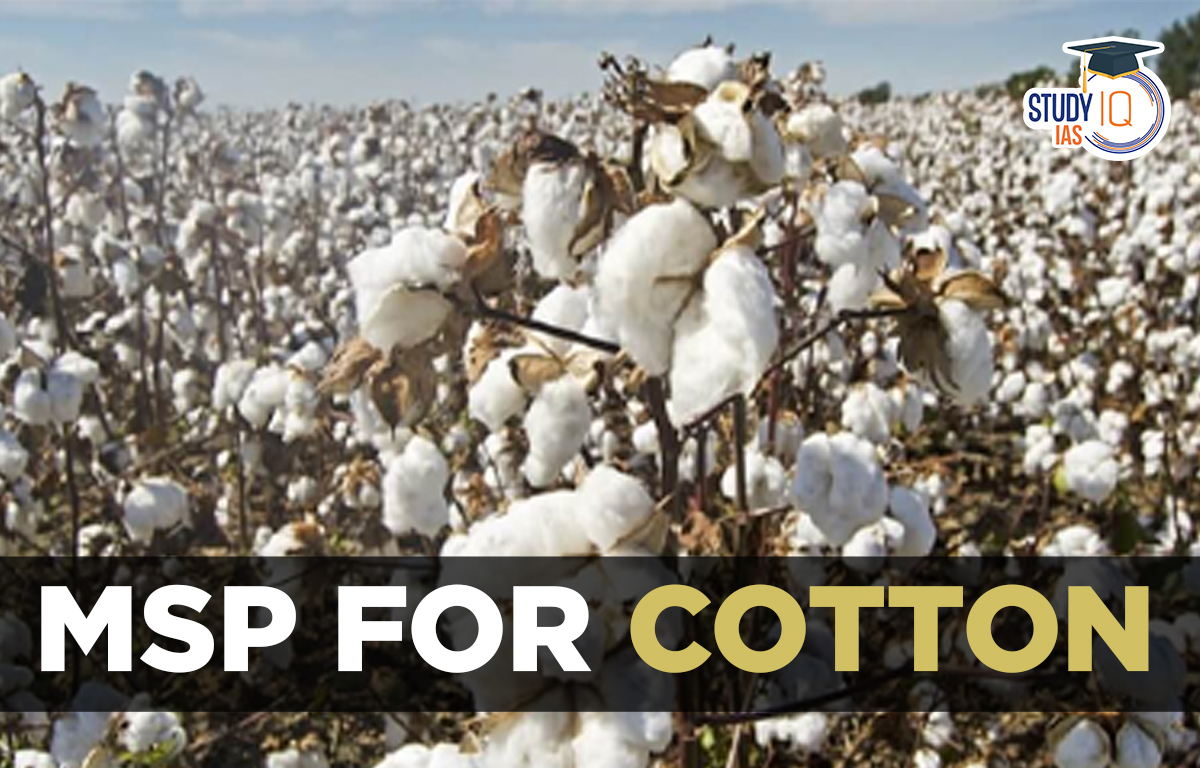Table of Contents
Context: Cotton farmers in several States have demanded an increase in the minimum support price (MSP) of the crop.
Minimum Support Price (MSP)
- It is a “minimum price” for any crop that the government considers as remunerative for farmers and hence deserving of “support”.
- Commission for Agricultural Costs & Prices (CACP) recommends MSPs for 22 mandated crops and fair and remunerative price (FRP) for sugarcane.
- CACP is an attached office of the Ministry of Agriculture and Farmers Welfare. It is an advisory body whose recommendations are not binding on the Government.
- The Cabinet Committee on Economic Affairs (CCEA) of the Union government takes a final decision on the level of MSPs.
- CCEA is chaired by the Prime Minister of India.
- MSPs have no statutory backing — a farmer cannot demand MSP as a matter of right.
- Crops covered under MSP
- 7 types of cereals (paddy, wheat, maize, bajra, jowar, ragi and barley),
- 5 types of pulses (chana, arhar/tur, urad, moong and masur),
- 7 oilseeds (rapeseed-mustard, groundnut, soybean, sunflower, sesamum, safflower, nigerseed),
- 4 commercial crops (cotton, sugarcane, copra, raw jute)
Purposes of MSP
- Food Security: Government incentivises the production of certain crops, thus ensuring that India does not run out of staple food grains.
- Remunerative Farming: MSPs create the benchmark for farm prices not just in those commodities for which they are announced, but also in crops that are substitutes.
More on the News
- MSP for medium staple cotton for 2022-23 kharif season is Rs 6,080.
- Currently, domestic prices are higher than the MSP of cotton.
- However, it is inadequate given the rise in price of input items such as seeds, pesticides and fertilisers.
- Reasons for Higher Prices than MSP:
- Good prices of cotton due to global situation.
- The import has decreased, which led to increase in local demand for cotton.
- Ban on Cotton seeds import: Cotton seeds is used as cattle and poultry feed, thus ban on import could help farmers get more prices for their produce.
Cotton Scenario in India
- India is the largest cotton producer (23%) in the world and has the highest area under cotton cultivation (39% of world area).
- India is the world’s third-largest exporter of cotton and the second-largest exporter of textiles, therefore, also contributing significantly to the country’s economy.
- 6 million small-to-medium-sized Indian cotton farmers and farm workers, participate in the global cotton value chain.
- Concern: Yield per hectare in India remained at a low of 460 kg lint per hectare when compared to the world average of 800 kg lint per hectare.
Cotton Industry in India
- About: Cotton yarn and fabrics export account for about 23% of India’s total textiles and apparel export.
- In 2019-20, India’s cotton production was 36.04 million bales of 170 kgs each.
- During 2019-20, export of cotton yarn, cotton fabrics, cotton made-ups and handloom products reached US$ US$ 10.01 billion.
- Challenges for the Industry:
- Price Rise: There is a price rise witnessed in the current season due to poor productivity despite a large area under cotton production in the Country.
- Poor Cotton Productivity: Cotton productivity is the biggest challenge in the country, resulting in less cotton production despite largest area under cotton cultivation.
Way Forward
- Addressing Price Rise: All stakeholders must be consulted for softening cotton prices on urgent basis, to address unprecedented price rise.
- Providing Quality Seeds: There is a need for making available better quality of seeds to improve productivity of cotton farmers.
- Collaborative Approach: All stakeholders must resolve cotton and yarn price issue, in the spirit of collaboration rather than competition and super profiteering.
- Insuring Farmers Welfare: There is a need for hand holding of cotton farmers who is the weakest part of cotton value chain, besides extending all possible support to stakeholders engaged in the backward and forward integration.
Cotton Corporation of India
- CCI was established on 31st July 1970 under the administrative control of Ministry of Textiles, Government of India as a Public Sector Undertaking under the Companies Act 1956.
- The major role of the CCI is to undertake price support operations, whenever the market price of cotton falls below the minimum support prices (MSP).


 Accredited Social Health Activists (ASHA...
Accredited Social Health Activists (ASHA...
 World’s 1st Unique Q-Shield Platform a...
World’s 1st Unique Q-Shield Platform a...
 IB ACIO Recruitment Notification 2025 Ex...
IB ACIO Recruitment Notification 2025 Ex...





















